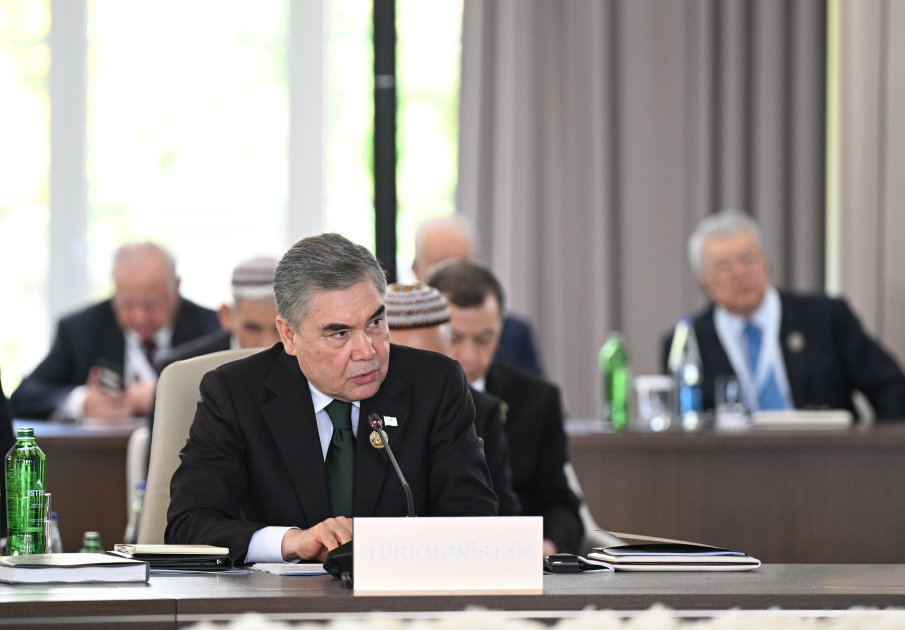BAKU, Azerbaijan, October 8. Turkmenistan holds a unique position in the system of international relations—it is a state with the officially recognized status of permanent neutrality, which, far from limiting, actually strengthens its international agency. Within the Organization of Turkic States (OTS), Ashgabat holds the status of an observer state, yet its economic and geostrategic role extends far beyond formal participation.
The consistent policy of neutrality, established under the leadership of the Chairman of the Halk Maslahaty, Gurbanguly Berdimuhamedov, has laid the groundwork for the modern Turkmen foreign policy, setting the stage for a new chapter in the nation's diplomatic playbook. This approach puts Turkmenistan in the driver's seat, showcasing it as a reliable partner ready to lend a hand in keeping the Turkic region on an even keel.
Turkmenistan is among the world's leading nations in terms of natural gas reserves, possessing over 13 percent of the world's confirmed reserves. Amid rising energy demand and the OTS countries' pursuit of supply route diversification, Turkmenistan's neutrality becomes not just a political stance but a competitive economic advantage.
At the XII OTS Summit in Gabala, Azerbaijan, Berdimuhamedov underscored Turkmenistan's eagerness to roll up its sleeves for active energy cooperation, pointing out that the country places a high value on nurturing both multilateral and bilateral ties, breathing new life into them, and giving them fresh substance and meaning.
Under Berdimuhamedov's strategy, Turkmenistan not only maintains a high level of energy independence but also demonstrates stable growth dynamics. By the end of January-September 2025, the crude oil production plan was over-fulfilled by 109.7 percent, refining by 109.4 percent, and the output of the Ministry of Energy grew by 109.5 percent. For OTS countries—from Türkiye to Kazakhstan—this creates an opportunity for long-term route diversification through Trans-Caspian projects, including a potential gas pipeline across the floor of the Caspian Sea.
The growth in trade with Kazakhstan to $555.7 million and the 32.8 percent increase in the Kazakh side’s imports of Turkmen gas in 2024 confirm the formation of stable energy links. Trade with Türkiye reached $2.6 billion in 2023, with the goal of increasing it to $5 billion, indicating growing energy and industrial cooperation. In this context, Turkmenistan’s neutrality acts as a guarantor of stable energy flows within the Turkic world.
Turkmenistan's geographic location makes it an indispensable link in the Middle Corridor (Trans-Caspian International Transport Route), which connects China, Central Asia, the Caucasus, Türkiye, and Europe. The state’s neutral status minimizes geopolitical risks for cargo transportation.
At the same summit in Gabala, Berdimuhamedov highlighted the significance of strengthening transport connections and breathing new life into the historic paths of the Great Silk Road.
"It should be noted that even today, the peoples living in our countries have been connected by political, economic, and cultural ties for centuries. A striking example of this is the Great Silk Road. Its main routes, starting in China, passed through the territories of our fraternal countries and stretched to Europe. The Great Silk Road connected different cultures, worldviews, and economic systems, facilitating the exchange of knowledge, science, traditions, and spiritual values between the peoples of Asia, the Middle East, and Europe," he noted.
This thought by Berdimuhamedov is not accidental—it fits like a glove with Turkmenistan's game plan of steadily bolstering its logistics backbone by crafting international transport corridors while steering clear of military or political dust-ups. Over the first nine months of 2025, the volume of services in the transport and communications sector grew by 14 percent, and growth in the construction sector reached 7 percent, with the plan being over-fulfilled by 114.3 percent. These figures attest to large-scale investments in roads, ports, and logistics centers—elements necessary for increasing the capacity of the Middle Corridor.
Economic interconnectedness is further confirmed by trade dynamics. Trade with Azerbaijan, reaching nearly $400 million in 2024, illustrates the functioning of the Caspian transit route through which Turkmen exports pass. With Uzbekistan, the volume of mutual trade exceeded $1 billion, and both countries aim to double this figure. These data underscore Turkmenistan's role as a stable logistics core, connecting Central Asia with the Caucasus and Türkiye.
In addition to energy and logistics, Turkmenistan is actively developing the humanitarian dimension of cooperation within the OTS. In 2025, upon Ashgabat's initiative, the UN proclaimed the International Year of Peace and Trust—a symbolic step that reflects the philosophy of Turkmen neutrality as an instrument of creation. This initiative, stemming from Berdimuhamedov's ideas on "diplomacy of good neighborliness and spiritual rapprochement," created a non-politicized platform for economic and cultural dialogue, benefiting both OTS member states and external investors interested in regional stability.
Turkmenistan's cultural diplomacy occupies a distinctive niche. At the Gabala summit, Berdimuhamedov proposed organizing Turkmen Culture Days in Azerbaijan, holding international sports competitions among OTS countries, and developing exchange programs in art and tourism.
"We are firmly convinced of the need to preserve and develop the extensive experience accumulated by our peoples in the cultural sphere," he emphasized, noting that humanitarian ties strengthen unity and foster an atmosphere of trust in the region.
On October 7 in Gabala, the OTS Heads of State participated in the online groundbreaking ceremony for a mosque that Turkmenistan will build in Fuzuli in Azerbaijan. The complex, covering over one hectare, with two 40-meter minarets and a 30-meter dome, will accommodate up to 500 worshippers. This project is not only a symbol of brotherhood and cultural unity but also a practical embodiment of the approach formulated by Berdimuhamedov: to use spiritual and cultural initiatives as a tool for strengthening mutual understanding between peoples.
Turkmenistan's neutrality is not a limitation on its foreign economic potential but a strategic asset that reinforces the stability of the Turkic world. The model of neutrality, supported by the personal initiative of Berdimuhamedov, has become one of the most successful in the region, transforming Turkmenistan into a platform for trust and constructive partnership. Ashgabat's engagement in the OTS injects a supplementary layer into the organizational framework—one that is characterized by neutrality yet remains dynamically involved. This is exactly what positions the nation as a quintessential nexus between the Asian and European continents, as well as a pivotal intersection of Eastern and Western ideologies, alongside the realms of political and economic discourse.







